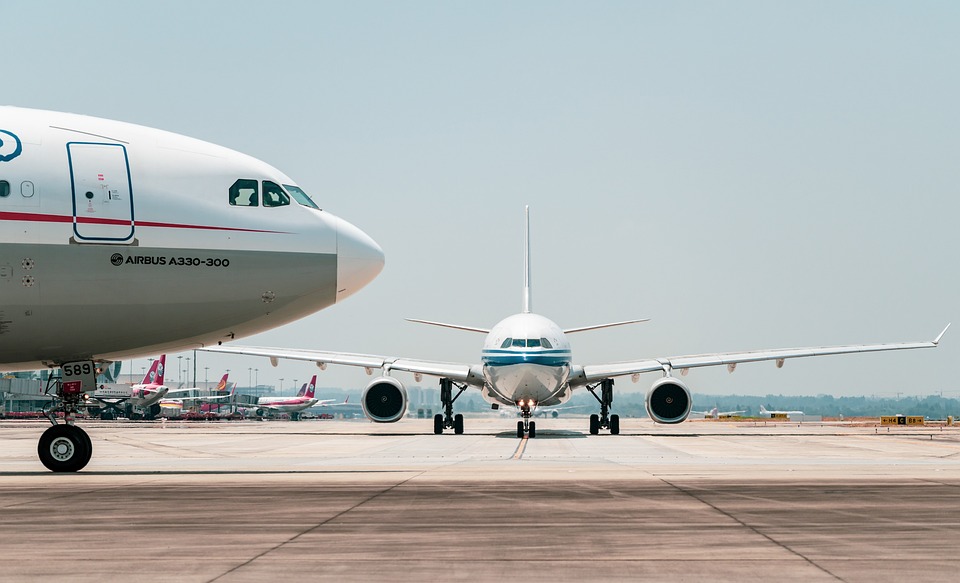In our last blog, we explained that the travel industry as a whole is showing genuine commitment to improving its environmental sustainability.
The global aviation industry is one of the largest contributors to greenhouse gases, accounting for approximately 2.5-3% of global carbon dioxide emissions.
It is therefore, no surprise that environmental, social & governance (ESG) is one of the most mentioned themes in airports and airline annual and quarterly filings.
And with the introduction of ‘Fly Net Zero by 2050’ policies, it’s never been more important for the aviation sector to commit to sustainability.
The goal of net zero by 2050 will require the full aviation industry (airlines, airports, air navigation service providers and manufacturers) to reduce its emissions by a significant amount.
The International Air Transport Association (IATA) have said that achieving net zero emissions by 2050 will require a combination of maximum elimination of emissions at the source, offsetting and new technology.
The aviation industry’s carbon footprint is projected to grow significantly following the rise in demand for air travel since the COVID-19 pandemic. This makes it crucial for airlines to adopt sustainable practices to mitigate their impact on the environment & help reduce climate change.

Why is sustainability important in the global aviation industry?
As we’ve covered, the aviation industry is responsible for a substantial amount of greenhouse gas emissions, noise pollution and various other negative impacts which have significant consequences on climate change.
That said, the aviation sector is under increasing pressure to prioritise sustainability due to growing public awareness and concern about many environmental issues including global warming, climate impact & air quality. Global airlines that do not invest in greener air travel may face reputational damage and a loss of customers who are concerned about the environmental impact of their travel.
For corporate entities, it’s important to choose an air travel partner that fly in a more sustainable way as it can demonstrate their commitment to reducing their carbon emissions throughout the business year.
Choosing a trusted travel management partner can help businesses demonstrate that commitment to sustainability by:
-
Implementing carbon offsetting programs
-
Selecting sustainable travel suppliers
-
Encouraging sustainable air travel practices
-
Providing data on travel patterns
-
Help create a pathway to achieve net zero carbon emissions
-
Educate employees on sustainable travel practices
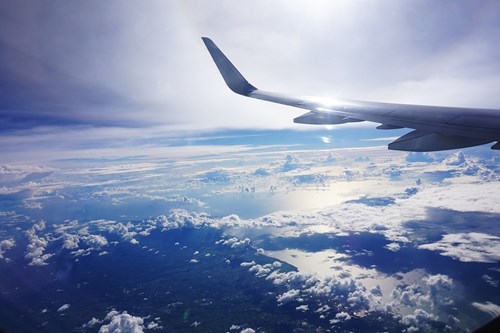
What is the aviation sector doing to become more sustainable?
Fortunately, many airlines are already taking steps to reduce their carbon emissions and improve sustainability across their operations. From investing in alternative fuels to implementing sustainable supply chain practices, airlines are making significant progress towards creating a greener future for air travel.
Sustainable aviation fuels
One of the primary ways that airlines are moving towards net zero emissions is through investing in sustainable aviation fuels. The international civil aviation organization (ICAO) defines sustainable aviation fuel as renewable or waste-derived fuels that meets globally-accepted environmental standards.
According to IATA, sustainable aviation fuels will make a 65% contribution to achieving net zero carbon emission by 2050.
Many airlines have already invested in sustainable aviation fuels and have reported a carbon reduction rate of up to 80% compared with the traditional jet fuel currently used.
New technology
Manufacturers have made significant improvements to aircrafts over the years and will continue to explore, adopt and invest in new technologies to improve existing and new models.
Many airlines are replacing older, less efficient planes with newer models that use advanced technologies to reduce fuel consumption and co2 emissions. For instance, Boeing’s 787 Dreamliner and Airbus A350 are two popular models that offer up to 25% more fuel efficiency than their predecessors.
These aircraft use lightweight materials, such as carbon fiber composites, to reduce weight and are designed with more efficient engines and aerodynamics.
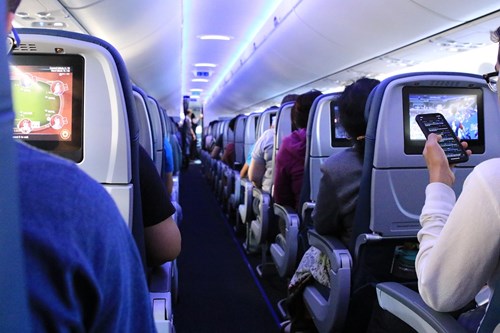
In addition, some airlines are using data analytics and artificial intelligence to optimize flight routes and reduce fuel consumption. By analyzing factors such as wind patterns and air traffic, airlines can identify the most fuel-efficient routes for each flight, reducing both emissions and costs.
Making the supply chain more sustainable
In addition to investing in more fuel-efficient planes, airlines are also implementing sustainable supply chain practices. For instance, some airlines are working with suppliers to source sustainable biofuels that can replace traditional jet fuel.
These biofuels are made from renewable sources, such as agricultural waste or algae, and can reduce carbon emissions by up to 80% compared to traditional jet fuel.
Reducing inflight single-use plastic waste
Another way that airlines are improving sustainability is through waste reduction and recycling initiatives. Many are working to minimize waste by replacing single-use plastic products with more sustainable alternatives, such as biodegradable cutlery and recycled paper products.
Some airlines are also implementing recycling programs to reduce the amount of waste sent to landfills.
Educating passengers on sustainable air travel
Many airlines are offering carbon offset programs that allow passengers to offset the emissions from their flights by investing in carbon reduction projects around the world, which range from renewable energy to reforestation.
Some airlines are also providing education and resources to help passengers reduce their carbon footprint while traveling, such as tips for packing light, minimizing waste and reducing unnecessary additional trips.

How are today’s airlines making operational improvements to enhance sustainability?
Airlines are taking significant steps towards creating a more sustainable future for air travel. From investing in fuel-efficient planes to implementing sustainable supply chain practices, airlines are making progress towards reducing their carbon emissions and minimizing their impact on the environment. Here are our top 5 sustainable initiatives for 2023.
KLM continues to integrate sustainable aviation fuels into their expansive fleet
KLM is arguably the most innovative carrier when it comes to integrating Sustainable Aviation Fuel (SAF) into their expansive fleet of aircrafts. KLM’s first milestone was way back in 2011 when it was the first airline to complete a commercial flight partly powered by fuel made from used cooking oil.
Now in 2023, all flights departing their hub at Schiphol airport in Amsterdam has a blend of at least 1% of SAF, which has doubled from 2022. The positive movement over the last year means they are well on their way to achieving their goal of 10% by 2030.
Unfortunately, sustainable aviation fuel has yet to be available on a large scale, meaning that it is extremely expensive to buy. Just a very small part of the millions of tons of jet fuel used by commercial airlines is SAF. Because of this, it is crucial for KLM’s commercial airline passengers to contribute to their sustainability vision by adding an SAF option to their booking.
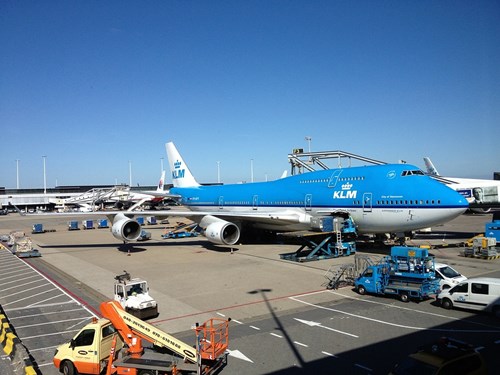
Lufthansa Group innovate to reduce drag during flights
Lufthansa Group of airlines have adopted an innovative solution inspired by nature to reduce drag during flight. Their latest technology, AeroSHARK, is a bionic adhesive film applied to the surface of their aircraft.
It replicates the skin of sharks to optimize the airflow around the aircraft while flying, enabling significant reduction in fuel consumption and carbon emissions.
In 2021, aircrafts that had been fitted with AeroSHARK prevented ~26,800 tonnes of co2 emissions and saved ~8,500 tonnes of kerosene. In 2022, all SWISS & Lufthansa Boeing 777 aircrafts will be fitted with AeroSHARK.
In addition to this they are also exploring two exciting innovations as a solution for tomorrow.
Sun-to-Liquid (StL)
The StL procedure uses concentrated sunlight, using mirrors, to produce carbon-neutral kerosene. Lufthansa would be the first airline in the world to fly with it and have since stated that SWISS will be the first airline to fly with this solar fuel worldwide.
Power-to-Liquid (PtL)
PtL technology produces sustainable aviation fuels from the likes of green electricity, water and CO2. Lufthansa Group will be the first customer for the world’s first PtL jet fuel made on an industrial scale.
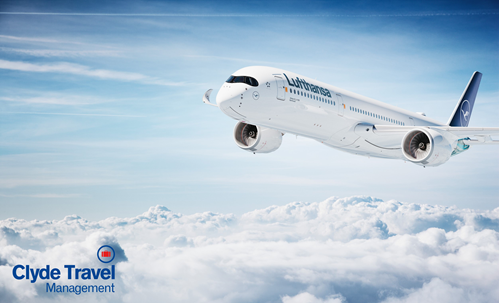
Widerøe on track to have the first zero-emissions plane
In 2019, Nordic regional airline Widerøe entered into a collaboration with Rolls-Royce on the development of zero-emissions aircrafts. The aim of the project is to develop an electric aircraft which both meets the Norwegian net zero carbon emissions target for 2030, and ultimately replaces Widerøe’s fleet of fossil fuel-powered aircrafts on the domestic short runway network.
They recently announced that this initiative is on track to have the first zero-emissions plane flying by 2026. It plans to have zero emissions planes replace its Dash 8-100 and Dash 8-200 planes with either electric- or hydrogen-powered planes between 2030 and 2035.
Emirates continues to invest in eco-efficient technologies
Emirates’ policy of investing in the most modern, eco‑efficient technology available means they have one of the youngest fleets in the industry. The environmental benefits of operating a modern wide‑body fleet include both reduced noise and lower engine emissions.
Emirates have for a number of years adopted many initiatives to reduce their impact on the planet such as fuel savings during taxing and landing, regularly cleaning their aircrafts with a water saving dry wash procedure & all blankets on long‑haul flights are made from 100% recycled plastic bottles to only mention a few.
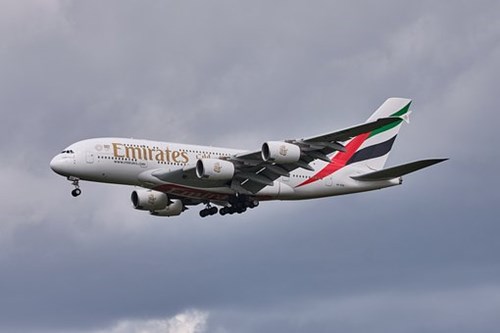
EasyJet lowers the CO2 percentage per passenger
Mitigating your impact on the environment doesn’t necessarily mean huge investments and ground breaking technologies.
When you consider the carbon footprint of a single flight, the more people that are onboard lowers the co2 percentage per passenger. As a low cost airline, it choses co2 efficiencies on every journey over luxury offering such as spacious business class cabins. EasyJet achieves this simply by ensuring the majority of flights are full of passengers.
Couple that with the mass introduction of Airbus NEO aircrafts, which are at least 15% more fuel efficient and also have a 50% noise reduction. All these measures mean that since 2000, easyJet have reduced their carbon emissions per passenger, per kilometre by one-third.
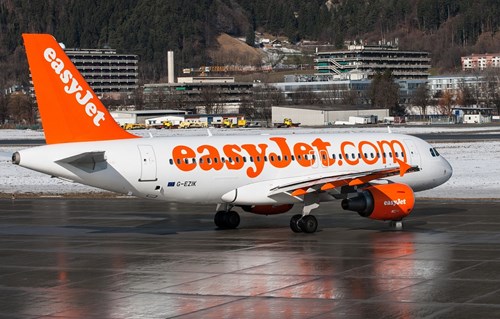
Choose a trusted travel partner to demonstrate your commitment to sustainability
The aviation industry is taking significant steps towards creating a more sustainable future for air travel. By implementing new initiatives, airlines are demonstrating their commitment to sustainability and helping to minimize their impact on the environment.
At Clyde Travel Management, we put sustainability at the heart of everything we do. If your business is looking for a more sustainable air travel partner, contact our team today to explore your options.



